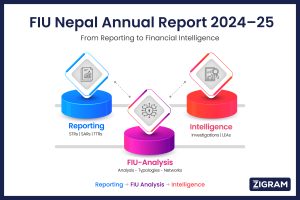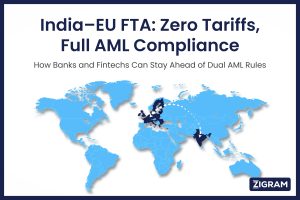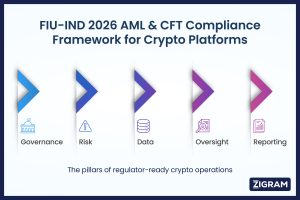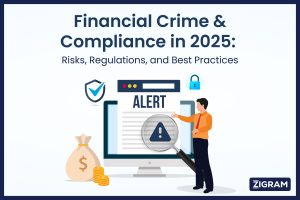Financial crime remains a persistent global issue, impacting individuals, businesses, and governments alike. The ripple effect of financial crime can have lasting consequences on economies, undermining consumer trust, business operations, and national security. In 2023, as the post-pandemic economy evolves, financial criminals are becoming increasingly organized and sophisticated in their methods. With heightened digital transactions and a rapidly changing economic environment, the detection and prevention of fraudulent activities are becoming more complex. It is crucial for companies to stay vigilant and anticipate emerging trends in financial crime to protect both themselves and their customers.

Key Financial Crime Trends in 2023
1. E-Commerce and Digital Payment Fraud on the Rise
The growth of e-commerce and digital payments has created new avenues for fraudsters. According to a report by ComplyAdvantage, the accelerated adoption of online banking and payments has provided a broader attack surface for financial criminals. Credit card fraud, particularly in digital channels, continues to be a significant concern. A notable trend is the rise of synthetic identity fraud, where fraudsters combine real and fake information to create new identities for the purpose of obtaining loans or credit. This growing menace is difficult to detect due to the hybrid nature of the identities involved.
2. Illicit Activity in Non-Banking Sectors
Another trend to watch is the increasing use of non-banking sectors—including gaming, gambling, and professional services—for illicit activities. These sectors often lack the same regulatory oversight as traditional financial institutions, making them attractive to financial criminals. The absence of a comprehensive regulatory framework in these areas has led to a rise in money laundering, fraud, and other financial crimes. As transactions continue to move outside of regulated banking channels, criminals are exploiting these loopholes with ease.
3. Crypto and DeFi as a Financial Crime Frontier
Cryptocurrencies and decentralized finance (DeFi) platforms have opened new frontiers for financial crime. As the popularity of these digital assets increases, so does the opportunity for bad actors to misuse them for illegal activities such as money laundering, terror financing, and political extremist fundraising. The lack of industry standards, security measures, and global regulatory clarity in the crypto and Web3 ecosystems compounds the problem, making it more difficult to track and combat illicit activities. Additionally, the use of DeFi platforms poses unique challenges for regulators and financial institutions, who must keep pace with the rapidly evolving technology.
4. Enhanced KYC and Real-Time Screening
To keep up with the rising volume of digital transactions, many firms are focusing on improving Know Your Customer (KYC) protocols and implementing real-time screening procedures. With global sanctions programs becoming stricter, there is a growing need for financial institutions to enhance their Anti-Money Laundering (AML) measures and improve sanctions screening processes. Real-time monitoring is critical to identifying suspicious activity as it occurs, allowing organizations to take immediate action.
5. The Rise of FRAML: A Unified Approach to Financial Crime
Historically, financial crime compliance and fraud detection have operated as separate silos. Compliance teams have focused on ensuring adherence to AML, sanctions, and other regulatory requirements, while fraud teams have dealt with detecting and preventing fraudulent activities. However, in 2023, a new approach is gaining traction: FRAML (Fraud + AML). This convergence of financial crime compliance and fraud detection is becoming essential as criminals operate across various channels, requiring a more holistic and unified response. According to a report by LexisNexis, integrating fraud and AML functions allows firms to better detect and mitigate risks by eliminating operational blind spots.
6. AI and Technology: The Future of Financial Crime Prevention
Financial criminals are leveraging advanced technology to carry out increasingly complex schemes, and financial institutions must do the same to stay ahead. Artificial Intelligence (AI) is playing an essential role in detecting patterns and anomalies in large datasets, allowing financial institutions to identify potential threats faster and more accurately. AI-driven solutions can analyze transactional data in real-time, flagging suspicious behavior that may otherwise go unnoticed. This shift toward technology-driven financial crime prevention will continue to be a major trend in 2023, helping companies detect, prevent, and respond to threats in an efficient manner.
There has been a rise in illicit activity through non-banking areas such as gaming, gambling, and professional services, and the lack of a comprehensive regulatory framework surrounding this industry. Moreover, there is an increase in the use of DeFi platforms for fundraising for political extremist groups, terror financing, and the use of the crypto space for financial crimes. The dearth of industry standards, security measures, and regulations in Crypto, Web3, and the metaverse will worsen the situation.
Building a Culture of Compliance
The integration of technology and real-time risk assessment processes will be crucial, but so will the adherence to regulatory frameworks. As the global landscape of financial crime shifts, companies must ensure they are compliant with evolving laws and best practices, while continuously educating their workforce on new trends in fraud and financial crime.
Financial crime continues to evolve, and 2023 is expected to see more organized and technologically sophisticated criminal activities. Companies must be vigilant in their risk assessments, enhance their KYC and AML procedures, and adopt a holistic approach to financial crime prevention. The convergence of fraud and AML functions, coupled with AI-driven technology solutions, will be key in combating the growing threat of financial crime. As criminals refine their tactics, financial institutions, businesses, and governments must ensure they remain one step ahead by staying informed of the latest trends and leveraging cutting-edge tools to protect their assets and reputation.
ZIGRAM is the one-stop solution for all your compliance needs. Try our FREE DEMO to experience the AI developed to fight against money laundering.
- #FinancialCrime
- #EmergingTrends
- #FraudDetection
- #FinancialCrimePrevention
- #EconomicImpact
- #RiskAssessment
- #ECommerceFrauds
- #SyntheticIdentityFraud
- #DeFiPlatforms
- #KYCProcedures
- #SanctionsScreening
- #AMLRequirements
- #CultureOfCompliance
- #ConvergenceOfCompliance
- #FRAML
- #AIInFraudDetection
- #TechnologyAdvancements
- #FinancialInstitutions
- #HolisticApproach
- #FinancialCrimeAwareness
- #RegulatoryFramework
- #Metaverse
- #Web3
- #Cybercrime







